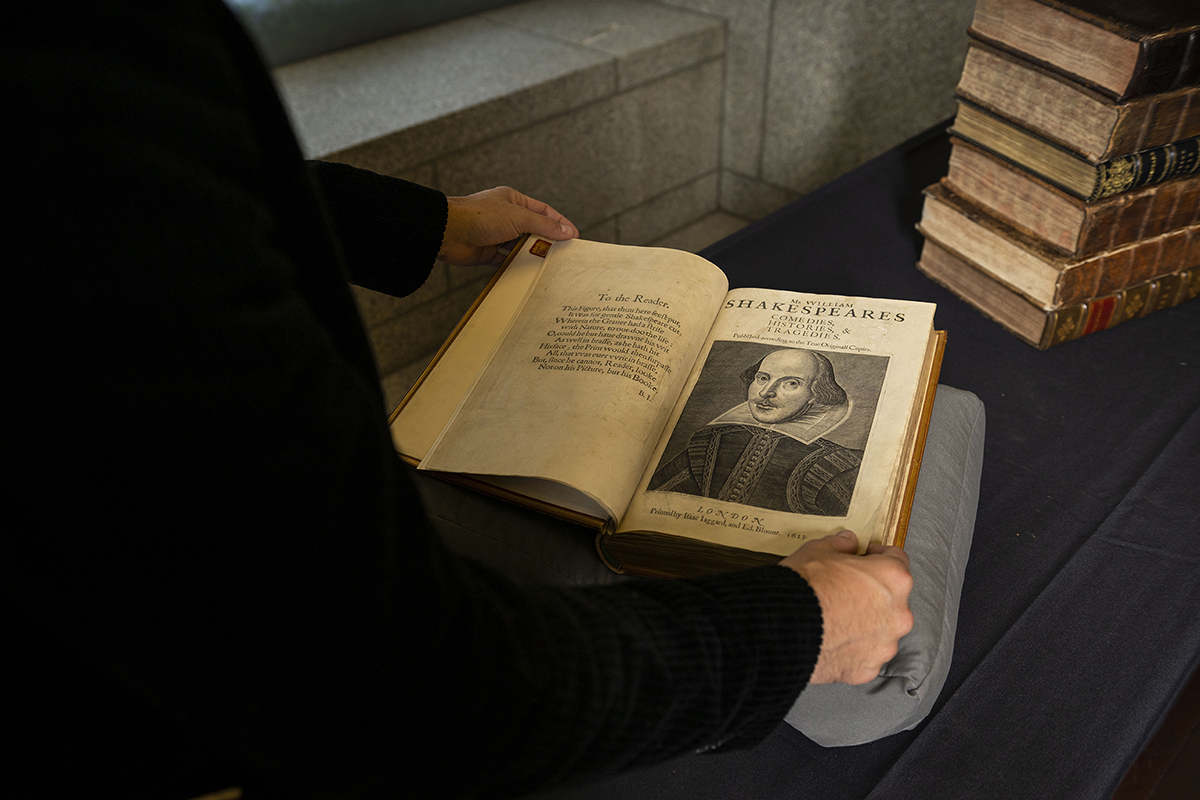
by Sarah Bender, Communications Coordinator
The Folger Shakespeare Library, which boasts the largest collection of Shakespeare in the world, is home to incredibly valuable resources and services that transform education and drive discovery about the early modern period. At the conclusion of two years of Shakespeare-focused programming at the University Libraries, Carnegie Mellon University has joined the Folger and more than 40 universities in the United States and abroad as a part of the Folger Institute Consortium. The Libraries will contribute a portion of the membership fee, which funds core institute activities.
The Folger Institute, a center for advanced research within the Folger Shakespeare Library, is long known for its ability to gather interdisciplinary communities of scholars for collections-based research. The consortium is committed to resource sharing between member institutions, enabling projects and research that just one organization wouldn’t be able to carry out alone. Since 1970, it has promoted an extensive program of scholarly activities, and taken a leading role in advancing research and teaching in the humanities.
“CMU’s membership in the Folger Consortium caps nearly two years of Shakespeare-centered programming in the Libraries: two major exhibitions, a beautifully-produced book, and a lecture by renowned Shakespeare scholar Stephen Greenblatt,” said Curator of Special Collections Sam Lemley, who curated the Libraries’ anniversary Shakespeare exhibitions and recently edited a book on the evolution of Shakespeare in print. “Benefits of consortium membership reach across campus, but I see this affiliation as an endorsement of the Libraries’ rare and early editions of Shakespeare and our work to promote the stories of those books over the last year or so. The Folger houses a vast and rich collection of rare materials to which CMU graduate students and faculty will now have ready access. In a way, consortium membership places CMU’s Special Collections in dialogue with the Folger’s collection and opens up exciting possibilities for research.”
Lemley will serve as a faculty representative on the Consortium Executive Committee, helping with planning and evaluation of consortium programming. CMU’s second faculty representative is Associate Professor of English and Director of Literary and Cultural Studies Stephen Wittek, whose work sits at the intersection of early modern drama, cultural studies, and digital humanities.
"Carnegie Mellon is an excellent place to work on Shakespeare! Our library holds an extremely rare copy of Shakespeare's First Folio. Our School of Drama is one of the best places in the world to study Shakespeare production. We are the home of the pioneering Shakespeare-VR Project. And we regularly bring leading Shakespeare scholars to campus through The Center for Print, Networks, and Performance (CPNP),” Wittek, who directs the Shakespeare-VR Project and co-directs the CPNP, said. “Our entry into the Folger Consortium will help to enhance these assets, and will make Shakespeare studies at CMU even stronger. I am looking forward to taking full advantage of the many unique benefits that membership will open up."
Members of the consortium unlock many useful resources, including access to Folger collections, a range of curatorial and reference services, and advanced seminars and other scholarly programs. Graduate students working in the humanities can take advantage of additional benefits — for example, dissertation writers enjoy exclusive eligibility for admission to an annual dissertation seminar.
Kim Weild, associate director and area chair of the John Wells Directing Program in the School of Drama, is especially excited about the opportunity to share additional resources with drama students and faculty.
“It’s all about access. Joining the Folger Institute Consortium provides important and meaningful expansion of access to one of the premiere Shakespeare Libraries and Institutes for CMU students and faculty,” she said. “Membership offers opportunities for research, residency, funding and even proposing ideas for symposiums that can lead to innovation by bringing together researchers, scholars and practitioners and ultimately pushing our field forward. I can’t begin to express how excited I am about this for CMU and our community.”
Additionally, the benefits of collaborating with the Folger Shakespeare Library go far beyond their Shakespearean expertise. “Shakespeare is only the Folger's ‘middle name,’” said Professor of English and Associate Department Head Christopher Warren. “They have astonishing collections in a whole range of areas and a whole center housed in the Institute dedicated to the History of British Political Thought. They offer fellowships for scholars working in literature, history, philosophy, and more. There are seminars for Ph.D. students writing dissertations, courses in early modern handwriting (paleography), and innovative efforts in data collection, data preservation, and digital humanities.
“In short,” he concluded, “our membership in the Folger Institute offers opportunities for many, many different communities on campus.”
For more information about Folger Institute Consortium opportunities, students and faculty can reach out to Lemley or Wittek.
